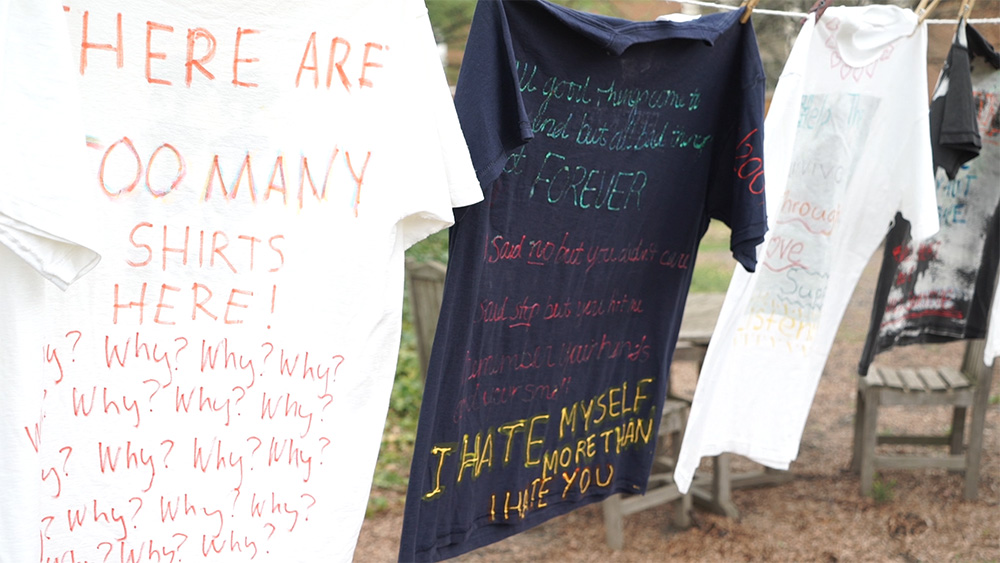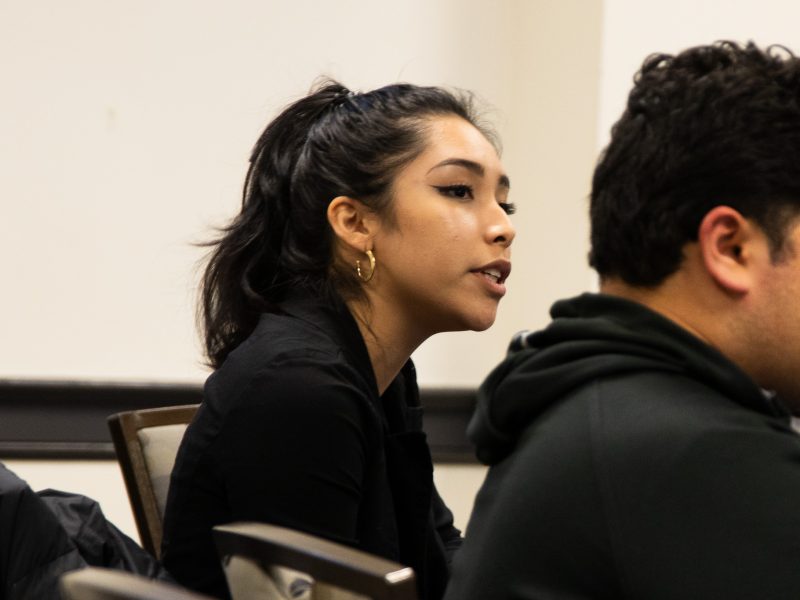Dozens of T-shirts hung from clotheslines in Hornbake Plaza Wednesday.
One read, “I trusted him. He was my friend.”
On a black fraternity T-shirt, a student had written the words “raped me” underneath the name of the frat.
The Clothesline Project — a biannual project run by the University Health Center’s CARE to Stop Violence Office — provides a visual for members of the university community “to see the impact of what sexual violence, relationship violence and stalking violence looks like,” said LaVonne Whitehead, CARE lead educator.
This university has been participating in the Clothesline Project since the 1990s, she said. The project began in Massachusetts in 1990.
“The Clothesline Project is an opportunity for survivors to share their story and for supporters to share their voices in cohesion with survivors,” Whitehead said. “For some, it may be really empowering just to be able to see that other people are survivors as well.”
[[Read more: “Reclaim this campus for them”: UMD students support sexual assault survivors at sit-in]]
CARE does not restrict what students write and display on the shirts, except that shirts cannot include a person’s full name, Whitehead said. While these messages may make some viewers concerned or uncomfortable, “these are people’s real experiences and we do not want to censor them,” she said.
“One in five women in college are sexually assaulted and one in three women are in abusive relationships,” Whitehead said. “So these are the people you see every day.”
The University of Maryland found seven students responsible for Sexual Assault I, defined as any type of non-consensual penetration, during the 2015-16 academic year. Four of these students were expelled while three others received suspensions.
This university is currently one of 228 institutions under investigation for violations of Title IX, a federal anti-discrimination law that prohibits sexual violence. The Education Department’s Office of Civil Rights currently has two open cases investigating how the university handles reports of sexual assault.
This university’s administration announced the creation of six new staff positions to address sexual misconduct on the campus in October, after the Student Government Association had proposed a mandatory student fee to help support the Office of Civil Rights and Sexual Misconduct. Title IX Officer Catherine Carroll had previously called the office “understaffed” and “underresourced.”
Christina Sessoms, a doctoral student in American studies, said she had visited Clothesline Project displays at other universities, but Wednesday was her first time seeing it at this university, where she works in the Office of Civil Rights and Sexual Misconduct.
“There are stories that need to be told,” she said.
Ana Valdes, a physics graduate student, said she supported the project on the campus.
“As a woman, you always feel a little more vulnerable,” Valdes said. “So I was happy to see it being made part of the conversation.”
[[Read more: A University Senate task force wants to expand sexual assault training programs]]
Kaitlyn Comer, a freshman accounting major and a member of Alpha Chi Omega sorority, was upset by a set of T-shirts detailing sexual assault in the Greek community. While fraternities and sororities undergo sexual assault training, Comer said the issue should “absolutely” be addressed within the community.
“The sorority side makes efforts … but still, when there’s alcohol involved nothing ever goes the way it should,” Comer said.
Josh Blume, a junior computer science major, did not know about the event until he saw the shirts hanging between the trees of the plaza. He said he did not understand the long-lasting effects that abuse can have until he learned that one of his friends was frequently assaulted.
Whitehead said she would encourage members of the university community to use the Clothesline Project as “an opportunity to have conversations and to create a change.”
“We can create a culture shift on our campus, Whitehead said, “where these things are not tolerated.”



